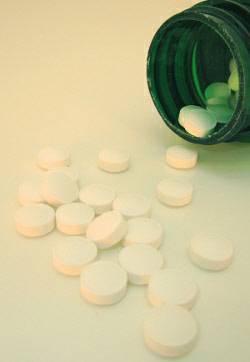
Melatonin
The hormone that decide when it's time to sleep!
Melatonin is a human hormone secreted in the pineal gland, located right in the center of the human brain. The purpose of melatonin is to regulate the circadian rhythms…in simple terms melatonin decides when it's time to sleep! Not surprisingly, melatonin's secretion in the blood stream depends on daylight cycles. During dark hours higher concentrations of melatonin are produced, while during the day its concentration decreases.
The process of sleep cycle synchronization all starts from our eyes! Certain photosensitive
ganglions in the retina (not involved in image recognition), "measure" the ambient
level of light and respond activating the photopigment melanopsin. This so called
non-
To be beneficial for the organism however, this internal clock need to be synchronized with the external time. The dependence of melatonin production on the daylight cycle is exactly part of this synchronization process.
In addition to naturally regulating sleeping patterns, melatonin is also one of the most powerful antioxidants. To understand how melatonin exerts its antioxidant activity, let's take a step back and see in general how antioxidants work. During the normal course of biochemical reactions in living organisms, several chemical substances (such as free radicals) can be generated, capable of damaging DNA, induce cancer, Alzheimer, Parkinson disease, and heart conditions. Natural antioxidants, in the body, have the ability to react with these substances and neutralize their detrimental activity. Most of these compounds however tend to lose their protective antioxidant skills after they react with radicals and eventually are transformed themselves into oxidant molecules.
Melatonin acts in a different way. Upon reacting with oxidant species, melatonin
permanently binds free radicals forming stable products that do not have pro-
Before you start filling your bathroom cabinet with melatonin and antioxidant supplements keep in mind that the research on antioxidants and their role in preventing diseases is very controversial. It is not clear yet if antioxidants have a real role in preventing oxidative stress and the diseases associated with it.
Because of its properties, melatonin was for some time considered a miracle molecule. Particularly during the early 90's, melatonin was included in "longevity" products, and received a lot of space in the press. Nowadays, the physiological properties of melatonin are better documented. Because of its ability to induce a "natural" sleep melatonin is a very popular supplement to attenuate jetlag and fight insomnia, and it is now the standard treatment for certain sleeps disorders.
In food, melatonin is found in yeast, rice, and vegetable products. Interestingly,
melatonin from food can not only affect melatonin blood concentration through ingestion,
but also trough interaction with other nutrients. Tryptophan for example, a nutrient
associated with post-
Melatonin is in general considered safe. Dosages in the hundreds of milligrams were administered to rats without adverse effects. However, although commercial supplements containing melatonin are available over the counter in the US, melatonin is still banned from sale without prescription in several countries including Germany.
Although its supplementation is considered safe, melatonin has been associated with
unwanted side effects. High doses of this hormone (3mg per day and above) have been
reported to induce drowsiness, headaches, next-

Your diet customized with one click!
One
Click
Diet
One
Click
Diet

Copyright © 2010 OneClickDiet.com All right reserved.
No part of this web-
Disclaimer: The information provided on this site is for informational purposes only and is not a substitute for medical or nutritional advice, or treatment for any medical conditions. You should consult a healthcare professional or nutritionist before starting any diet, exercise or supplementation program, or if you have or suspect you might have a health problem. Actual results from nutritional plans and diets as well as exercise activities usually vary among individuals. The products and the claims made about specific products on or through this site have not been evaluated by the United States Food and Drug Administration (US F.D.A.) and are not intended to diagnose, treat, cure or prevent any disease. You should not use the information on this site for diagnosis or treatment of any health problem or for prescription of any medication or other treatment. Please view our full "Terms Of Use" for more information and the terms and conditions governing your use of this site.
Home
About
Contact us
